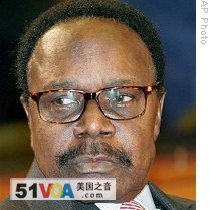Dakar
07 June 2009
The Committee to Protect Journalists says it is alarmed by the suspension of two independent newspapers in Gabon and the increasingly hostile environment for private media in the country.
The Committee to Protect Journalists says the suspensions are part of a larger government crackdown on private media coverage of the president's hospitalization and potential succession.
 |
| Gabon's President Omar Bongo (File) |
Mohamed Keita, an Africa researcher at the Committee to Protect Journalists, says, though no journalists have been murdered in Gabon, a pattern of repression has bred intense self-censorship within the private media.
"It is really about what you cannot measure, what you cannot see, the self censorship. Journalists gradually have learned not to cross certain lines, even though some of them do at times and do get into trouble," said Keita. "But, on the surface, it appears to be relatively a country with relative press freedom. But if you look at the situation in recent years you will see a staggering number of suspensions of newspapers, almost routinely. The media regulator has almost become an arm of government censorship."
The Committee to Protect Journalists has accused Gabonese authorities of imprisoning journalists and suspending or banning newspapers to silence critics over sensitive topics including President Bongo's health and finances.
Keita says it is rare for journalists to successfully appeal these decisions and often the charges used to justify the suspensions are not substantiated, which he says points to political motivations.
Media coverage of President Bongo's hospitalization has also further heightened tensions between France and Gabon, its former colony. Gabon's media regulator has issued warnings to French broadcasters, and two French journalists were denied entrance into Gabon on Monday for allegedly lacking proper accreditation.
Keita says the French media has led the way in covering high-profile stories that local media is reluctant to touch. One such issue has been an international legal complaint filed in France in February questioning how President Bongo amassed his personal wealth.
President Bongo has ruled Gabon for more than 40 years. Keita says this recent escalation in media repression could be a sign of worse to come.
"The government is trying to control the message here, as a potential political crisis looms. Press freedom, of course, goes hand in hand with political crisis," said Keita. "Usually the media is the first to be targeted and in this particular case, there's an attempt to control the message here. But our position is that the health and succession of a public figure like President Bongo is a matter of public concern and that the media should be allowed to report on this very important issue."
Keita says the Committee to Protect Journalists is concerned about the future of independent media in Gabon and will be monitoring the situation closely.